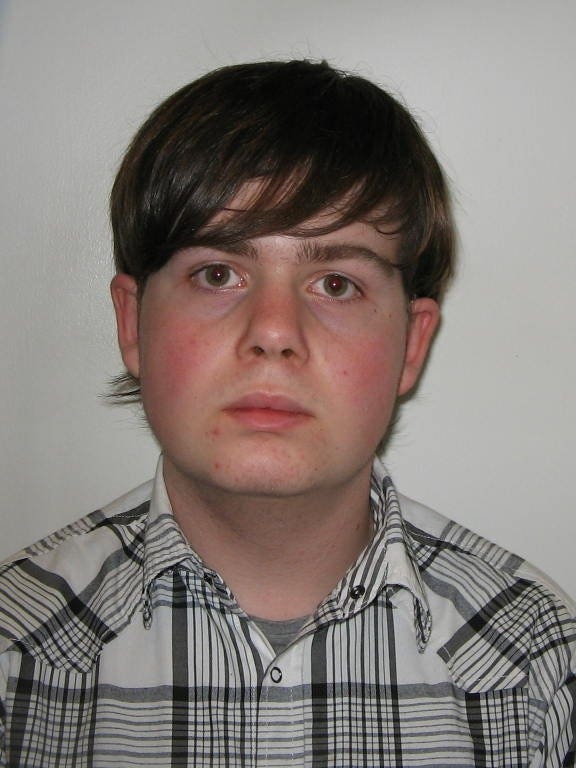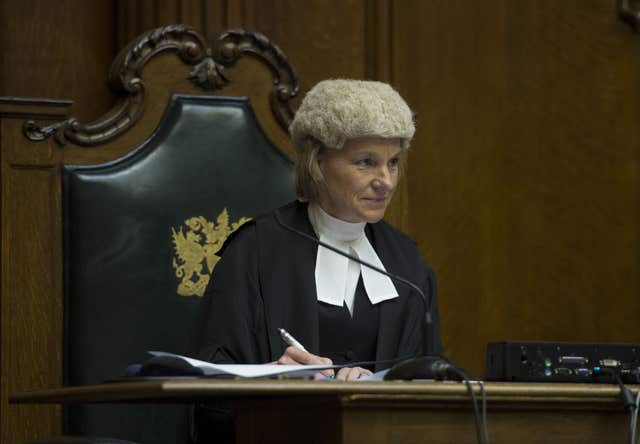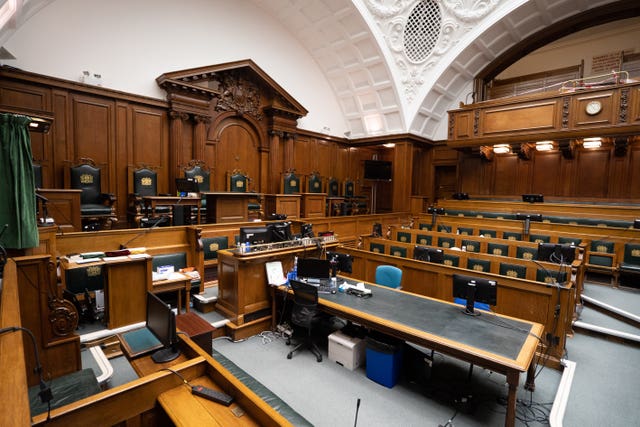A young man has been jailed for life for the “ferocious” killing of his grandfather in the first televised criminal sentencing in England and Wales.
Judge Sarah Munro QC made legal history at the Old Bailey on Thursday as she handed 25-year-old Ben Oliver a minimum term of 10 years and eight months for manslaughter.
The footage was being broadcast on news channels and being made available online through Sky News, the BBC, ITN and the PA news agency.
The move to allow cameras in the crown court follows a change in the law in 2020 but implementation was delayed due to the pandemic.
The sentencing of Oliver took place in Court Two, one of the Old Bailey’s oldest courtrooms.
The defendant, from Bexleyheath, south London, had been cleared of murder having admitted the manslaughter of 74-year-old David Oliver, in Mottingham, south London, on January 19 last year.
Oliver’s autistic spectrum disorder combined with other emotional and mental factors diminished his responsibility for the killing, the court was told.
Sentencing him, Judge Munro set out Oliver’s troubled family background and depression in the lead up to the killing.
In 2016, Oliver was convicted of sexual offences against a young girl when he was aged 15 and he was released from youth detention in September 2019.
Judge Munro noted he had loved his grandparents but that turned to hatred towards his grandfather on learning of allegations of sexual abuse against him.
Oliver developed an “obsessional tunnel vision” leading to a determined decision to kill in a “ferocious” way, the judge said.
Outlining events, the judge told Oliver: “On the 19th the carers came as usual to see to your grandfather’s needs. When they had gone your nan took him a biscuit and coffee. That was the last time she saw him alive.

“You were noted to be jittery and couldn’t rest. You asked to lie down with your nan which you did.
“However, when she got up you went downstairs. It was around 11.30-11.45am. You selected a knife from the kitchen and you went to your grandfather’s room.
“You cut his throat repeatedly with severe force, you stabbed his mouth so he could not cry out and his eyes so that he couldn’t look at you as you killed him.
“He tried in vain to protect himself by raising his right arm. He was utterly powerless.
“There were a total of 21 stab wounds to the face, seven to the torso and obvious defence injuries. He died very quickly of massive blood loss.
“Following the killing you told your nan what you had done saying ‘he can’t hurt you anymore, nan’. You also texted your mother saying ‘Mum I’ve killed grandad, I love you.’
“Nan called 999 as you sat with her. At one point you went upstairs and sat on the windowsill. I am satisfied that you had it in mind to jump to your death but your nan persuaded you to come in and you calmly sat with her until the police arrived.
“You were entirely co-operative. Your nan told police ‘we all wanted to kill him’.”

After weighing up aggravating and mitigating features, the judge told Oliver: “In your case I do consider the seriousness of the offence does justify a life sentence.”
However, the judge acknowledged Oliver’s guilty plea and expression of remorse when he told a probation officer: “I’ve just made it worse, made the pain greater.”
Earlier in mitigation, Jennifer Dempster QC said: “The word tragic is a word perhaps over used in this building to describe some cases – not so in this particular case.”
She said a series of “deeply unfortunate events” had combined to make an “almost perfect storm” in which the killing happened.
“This is a young man who on a number of levels was woefully let down by those who should have been looking after him,” she said.
The move to broadcast Oliver’s sentencing was announced by the Ministry of Justice on Wednesday and was hailed by broadcasters as a “landmark moment for open justice” and a “victory for the viewer”.
Lord Chancellor and Justice Secretary Dominic Raab said: “Opening up the courtroom to cameras to film the sentencing of some of the country’s most serious offenders will improve transparency and reinforce confidence in the justice system.

“The public will now be able to see justice handed down, helping them understand better the complex decisions judges make.”
The Lord Chief Justice of England and Wales, Lord Burnett of Maldon, said the move was “very positive” in promoting open justice.
He said: “I think it’s an exciting development because it will help the public to understand how and why criminals get the sentences that they do in these very high-profile cases.
“Sentencing of serious criminal cases is something in which there is a legitimate public interest.
“And it’s always seemed to me that this is a part of the criminal process which can be recorded and broadcast in many cases, but not all, without compromising the administration of justice or the interests of justice.”
The Central Criminal Court in London routinely hears some of the most complex cases, including murders and terrorism trials.
Under the change in the law, High Court and Senior Circuit judges sitting in crown courts can be filmed delivering their sentencing remarks.
Only the judge will be on camera to protect the privacy of victims, witnesses and jurors.




Comments: Our rules
We want our comments to be a lively and valuable part of our community - a place where readers can debate and engage with the most important local issues. The ability to comment on our stories is a privilege, not a right, however, and that privilege may be withdrawn if it is abused or misused.
Please report any comments that break our rules.
Read the rules hereComments are closed on this article